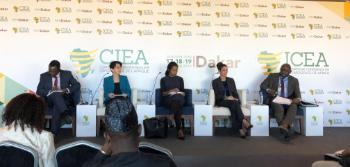Mobilisation of tax revenues and private sector engagement
International Conference on the Emergence of Africa (ICEA)
17 - 19 January 2019

Centre International de Conférences Abdou DIOUF
Dakar, Senegal
The International Conference on the Emergence of Africa (ICEA) is a platform of exchange which was established with the primary aim of: supporting the structural transformation processes while sharing expertise and good practices in this area and initiating substantive discussions for an optimal implementation of the emergence plans. The first two editions of the ICEA, held respectively in 2015 and 2017 in Abidjan, served as an opportunity for leaders of African countries, national experts and TFPs to analyze various trajectories of emergence and explore in greater depth the issues around the selected themes.
The third edition of the ICEA, was jointly organised by the Government of Senegal, the United Nations Development Programme (UNDP), in partnership with the World Bank and the African Development Bank (ADB), and took place from 17 to 19 January 2019 in Dakar (Senegal), focussing on the central theme: "Emergence, Private Sector and Inclusiveness".
SIDE EVENT - MOBILISATION OF TAX REVENUES AND PRIVATE SECTOR ENGAGEMENT
Saturday, 19 January 2019 from 09:00 to 11:00
 This side event was an opportunity to learn more about the complex domestic resource mobilisation challenges faced by many countries in Africa and how those can be addressed, including with the support of development partners. African countries need to mobilise more resources from all sources to enable the structural transformation of their economies over the next decade, in line with the ambitions of the 2030 Agenda for sustainable development. Domestic resources are particularly critical. They are the single largest and most important source of revenue for sustainable development. However, while some countries have made substantial progress in tax reform, tax ratios overall remain weak across many of these countries. Some of the most important and fastest growing economic sectors in the region benefit from widespread tax exemptions. Multinational enterprises meanwhile often engage in highly complex and aggressive tax planning strategies which results in major revenue leakages for countries, especially in key economic sectors such as the extractive industries.
This side event was an opportunity to learn more about the complex domestic resource mobilisation challenges faced by many countries in Africa and how those can be addressed, including with the support of development partners. African countries need to mobilise more resources from all sources to enable the structural transformation of their economies over the next decade, in line with the ambitions of the 2030 Agenda for sustainable development. Domestic resources are particularly critical. They are the single largest and most important source of revenue for sustainable development. However, while some countries have made substantial progress in tax reform, tax ratios overall remain weak across many of these countries. Some of the most important and fastest growing economic sectors in the region benefit from widespread tax exemptions. Multinational enterprises meanwhile often engage in highly complex and aggressive tax planning strategies which results in major revenue leakages for countries, especially in key economic sectors such as the extractive industries.
All stakeholders, including governments, development partners, multilateral financial institutions and the private sector, amongst others, have a role to play to support more effective domestic resource mobilisation in these countries. A leading panel of experts at the side event also discussed success stories and how these were achieved, as well as how governments could effectively engage with the private sector, so that companies are responsible ‘citizens’ in Africa.
Speakers:
- Mr. Amadou Abdoulaye BADIANE - Director, Legislation & International Co-operation, Senegal Revenue Authority
- Ms. Samia ABDELGHANI - Tax Advisor, Centre for Tax Policy and Administration, OECD
- Ms. Eunice KAMWENDO - Strategic Advisor, Regional Bureau for Africa, UNDP
- Ms. Cemile SANCAK- Resident Representative, IMF
Moderator:
- Mr. Ayodele ODUSOLA - Chief Economist & Head, Strategy & Analysis Team, Regional Bureau of Africa, UNDP
FURTHER INFORMATION
- Follow us on Twitter: @TIWB_News
- Contact us: secretariat@tiwb.org
Related Documents

